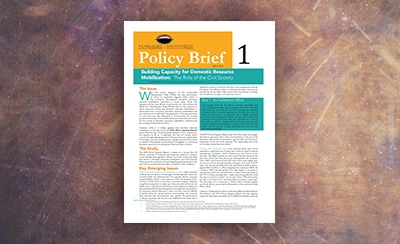
The first Policy Brief by the African Capacity Building Foundation (ACBF) released in March 2016 focuses on the role of the civil society in building capacity for Domestic Resource Mobilization (DRM).
The Policy Brief points out that the civil society can play a leading role in bargaining with the Government on behalf of the people around effective strategies for mobilizing domestic resource and curbing illicit financial flows in Africa. The brief describes the civil society to consist of organized groups and institutions that are independent of the state.
The 2015 Africa Capacity Report (ACR) did find that citizens are largely reluctant to pay taxes due to lack of transparency in the use of tax revenues, high levels of corruption in government and the lack of awareness on the use of tax revenue. The watch-dog role of the civil society hence becomes critical.
According to the 2015 ACR, one of the major determinants of resource mobilization capacity is the willingness of the population’s income earners to save and to pay taxes. In this process, the civil society acts as the watchdog of the state activities and advocates that citizens realize the importance of paying taxes.
As a way of averting the financial challenges, governments could engage the civil society as potential partners in enhancing their capacity in improving domestic resource mobilization policies and in harnessing resources that could be tapped upon.
This Policy Brief is part of a four series being developed by the Knowledge, Monitoring and Evaluation department at ACBF. The remaining three will focus on the role of governments, donors and the private sector on DRM.
Read the Policy Brief





